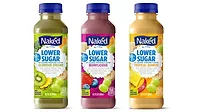Drowning in Research
Drowning in Research
Sarah Theodore
Editor
Everywhere we turn these
days, we’re being told that consumers want to take charge of their health. They are more receptive to, and asking
for more healthful product offerings. And the beverage industry has been
responding with new products and research into healthy, possibly even
medicinal, ingredients. The media also has responded with story after story
about foods, beverages and ingredients that will make us healthier, or in
turn, could damage our health.
I used to read and listen to many of those reports. I
try to be as knowledgeable as possible about healthy lifestyle choices,
even if I don’t always make them. But during the past month or so, I
have seen so many contradictory reports that it has made me wonder if all
of this news is any help at all. There was a report that indicated wine
drinkers have a lower risk of colon cancer, but beer and spirits drinkers
have a higher risk; stories about green tea aiding in cancer prevention at
the same time a Food and Drug Administration report came out saying green
tea has no proven cancer-prevention properties. And my favorite, by far, is
a new book titled “The Milk Imperative” that claims dairy milk
is the main dietary cause of osteoporosis. Huh? I though we were supposed
to drink milk to prevent osteoporosis. Rather than feeing more proactive about my health,
I’ve started to think I might just go out and eat nothing but junk
food, and at least enjoy myself while I wait for my bones to start
crumbling from all of the dairy I’ve consumed.
I often talk to companies that produce what are
arguably some of the healthiest beverages on the market and ask them how
they communicate their products’ benefits to consumers. Many times I
am surprised when they say they don’t. Some of them help fund
research, and if you search on their Web sites, you can find information on
their health benefits. But rarely do they make a claim, choosing instead to
highlight flavor, packaging or other aspects of their products. Perhaps
this stems from legal concerns, but I’m starting to think it’s
a smart policy.
I’m not saying manufacturers should stop
promoting healthful products; there is no doubt that it is the
industry’s future. But aren’t there better ways to deal with
all of this information? Is there a way the industry can help consumers and
the general media understand some of this research rather than add to the hype? Or is a matter in which any publicity
is good publicity? I have to think the only thing we are creating with this
landslide of contradictory studies is confusion that will lead to burnout
among consumers and a backlash against the very products that really could be good for them. BI
Sneak Peek
| NOVEMBER |
| Corporate profile — Tampico Beverages |
| Category Focus — Energy and sports drinks |
| Marketing — Cross-merchandising promotions |
| Beverage R&D — New flavor trends |
| Wall Street analysis |
| Packaging — Promotional packages |
|
|
| Beverage R&D — Fortification update |
| Special report — The best new products of 2005 |
|
|
Looking for a reprint of this article?
From high-res PDFs to custom plaques, order your copy today!



